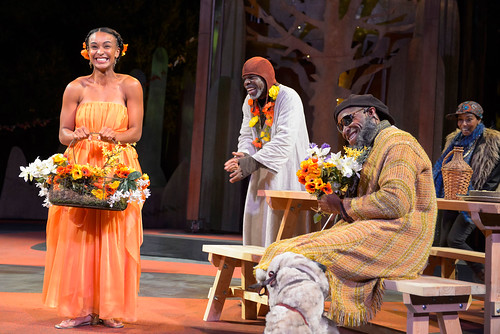Cal Shakes' lukewarm take on Winter's Tale
 L. Peter Callender (far left), Tyee Tilghman, Margo Hall (center), and Christopher Michael Rivera deal with unexplained jealousy in Cal Shakes’ production of A Winter’s Tale, directed by Patricia McGregor. Below: (from left) Tristan Cunningham, Callender, Aldo Billingslea and Hall celebrate spring in Bohemia. Photos by mellopix.com.
L. Peter Callender (far left), Tyee Tilghman, Margo Hall (center), and Christopher Michael Rivera deal with unexplained jealousy in Cal Shakes’ production of A Winter’s Tale, directed by Patricia McGregor. Below: (from left) Tristan Cunningham, Callender, Aldo Billingslea and Hall celebrate spring in Bohemia. Photos by mellopix.com.
On a refreshingly brisk autumn night, California Shakespeare Theater's A Winter's Tale aimed to tell a sad story with a happy ending. "A sad story is best for winter," or so we're told by a young boy not long for this earth.
Even by Shakespearean standards, this is a strange play, with its jarring shifts in tone, unexplained fits of jealousy, interference by the gods and living statuary. In other words, it's a director's dream – here's a wacky play that needs lots of interpretation and massaging to make it work for a modern audience.
Cal Shakes previously closed the season with A Winter's Tale in 2002 with a massive production in which the audience moved around to accommodate the shift in action from Sicilia to Bohemia. Director Lisa Peterson hauled out screaming teenagers, a school bus and an all-out rave before audience members headed back into the theater proper for the moving, if fantastical, finale.
This time around, we get a wildly different Tale directed by Patricia McGregor, who returns after the triumph of last season's Spunk, and her production is only fitfully successful. There's a half-baked concept here that the story is told by a troupe of traveling actors, but this approach – so beautifully realized in Cal Shakes' 2008 Pericles – makes little sense when there's a towering, rotating set piece (by Michael Locher) standing center stage. This troupe certainly doesn't travel light. The concept really seems more of an excuse to use nine actors to tell this complex story, which only reminds us of the "storytelling" concept before and after intermission and toward the end when there's a nearly disastrous abridgment of the play that is rapped for our "enjoyment." And there's one awkward scene where Tyee Tilghman playing Camillo and Florizel has to be both characters in the same scene, so one of them stays conveniently out of view behind a small travel trailer, while other actors pretend to see him or interact with him.
Attempts at audience interaction are well intentioned but don't add much to the experience. At Wednesday night's performance a lumberjack-looking fellow was pulled out of the audience to stand by the maypole while actors and ribbons whirled around him. Can't imagine that was a theatergoing highlight for Mr. Bunyan. And pre-show plate spinning and cavorting also lacked the necessary pizzazz, as did the attempt at a sing-along in Act 2, which bombed primarily because the song (with lyrics on a handy program insert) is hard to sing and not remotely catchy.
Two things about this production work well: Shakespeare and McGregor's cast. This may be a weird and wacky play, but Shakespeare knew what he was doing. The master of set up and denouement, Shakespeare spins a lot of plates (more effectively than the actors in the pre-show) but knows just how and when to take each plate down. There's a certain satisfaction in the storytelling here, even though McGregor's attempt to speed things up toward the end bleeds any emotion out of the ending, and that's all Shakespeare.
When you need someone to play an intense king, who swings from wild, unfounded jealousy to soul-deep repentance within just a few scenes, you hire L. Peter Callender, an actor who can make emotional sense out of just about anything (and in a nice twist, he played Polixines in the 2002 production, so he has true insight into the pain his current character is causing). The reasons for King Leontes' jealousy are never clear – he just decides that his Queen Hermione (Omozé Idehenre) is having an affair (and a child) with visiting King Polixenes (Aldo Billingslea) of Bohemia. After trying to kill Polixenes and then imprisoning his pregnant wife, Leontes is smacked down by a message from the oracle saying he's a tyrant and has done his wife and friend a horrible wrong. To watch Callender navigate this steep emotional terrain is to watch an actor in full command. We don't understand Leontes, but we absolutley believe him.
The same is true of Idehenre as Hermione, a regal monarch and loving mother who finds herself the victim of her husband's temporary insanity. Shackled in a courtroom, pleading (with dignity) for her life, Idehenre's Hermione is a vision of grace and strength coming from deep pain.
In supporting roles, Billingslea and Margo Hall provide exactly the kind of support you want here – serious when it needs to be (Billingslea's wronged Polixenes, Hall as the protective Paulina) and lighter when called for (Hall as a Bohemian clown, Billingslea as the famous exiting bear).
While this production focuses on the more tragic parts of the play in its first half, all's well that begins well. The actors are excellent and the story theater gimmick is kept at bay. Once the story zips forward 16 years and shifts to Bohemia, the tone wobbles and director McGregor loses control of the emotional through line, in spite of her actors' best efforts. Here is a Winter's Tale that chills, heats up and then more or less melts.
FOR MORE INFORMATIONCalifornia Shakespeare Theater's A Winter's Tale continues through Oct. 20 at the Bruns Amphitheater, 100 California Shakespeare Theater Way, Orinda (free shuttle to and from Orinda BART station). Tickets are $20 to $72. Call 510-548-9666 or visit www.calshakes.org.
